"Freedom is an adventure with no end..."
When I think of traveling, going on a journey, riding down a dirt road, hiking a trail, following a path or taking a trip, certain writers like Jack Kerouac, Colin Fletcher and Carlos Castaneda come to my mind.
These were the spiritual godfathers who were partly to blame for my lust for the ultimate adventures. The kind of adventures that could and did lead me to many important and valuable lessons in life. Along the way, as I became inspired to reach for ever higher goals, I also benefitted from gaining motivation and determination, and learned that I had improved my life by acquiring dedication with enough discipline to reach some summits.
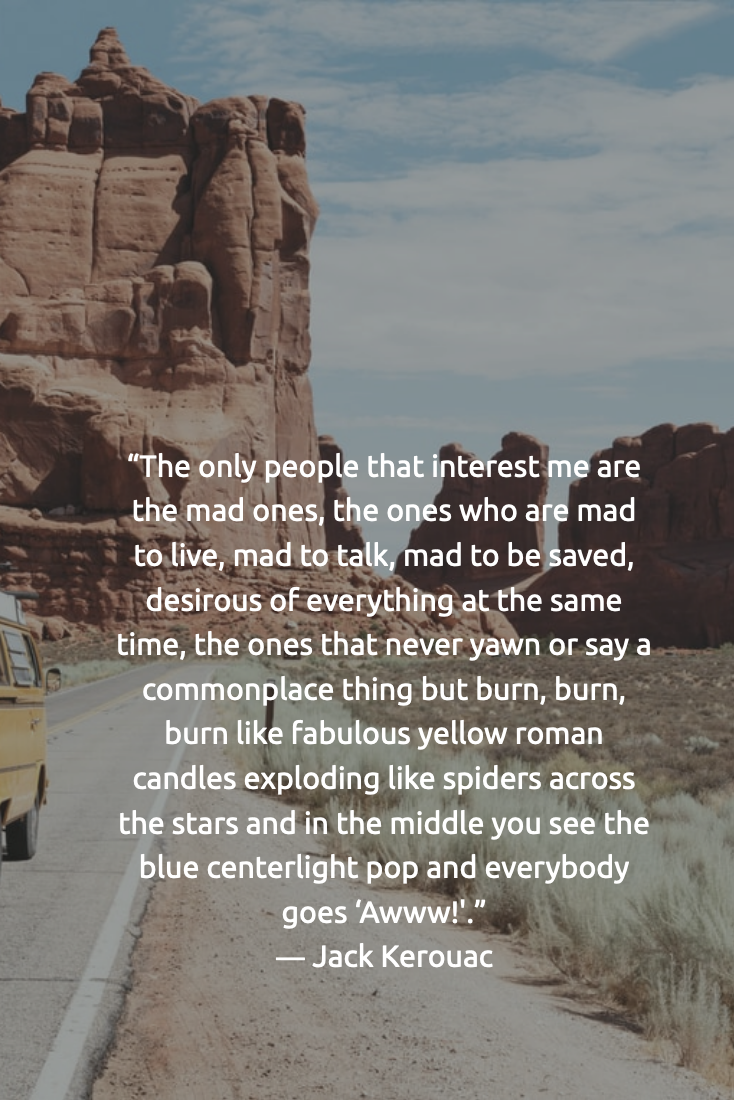
Kerouac (or really, Sal Paradise) Says...
“There was nowhere to go but everywhere, so just keep on rolling under the stars.”
Jack Kerouac’s cult classic On the Road is a story about a series of road trips out west taken by a couple of travelers in search of glory and a broader meaning of life. Without spoiling the plot, let's just say that the tales from this book could be construed as one of the ultimate Common Core teaching tools for angsty teenagers.
Kerouac (1922–1969) and his literary works had a major impact on the popular rock music of the 1960s. Artists including Bob Dylan, The Beatles, Patti Smith, Tom Waits, The Grateful Dead, and The Doors all credit Kerouac as a significant influence on their music and lifestyles.
His next published novel, The Dharma Bums, described Kerouac's clumsy steps toward spiritual enlightenment on a mountain climb with friend Gary Snyder, a Zen poet.
Traveling on the road has often been associated with long journeys or series of journeys, especially as part of one's job as a performer and entertainer. Never mind that weary worn-out feeling that you get from many miles of the rubber meeting the road. The goal is moving forward and taking the fork in the road that leads to the heart of your desires.
But the phrase "taking to the road" has broader implications. Because journeys are often undertaken to find something, someone or somewhere. And along the way, further down the road from here, it might be that fame and fortune have come along for the ride. At the very least, we could hope for some great adventures to remember later on in life.
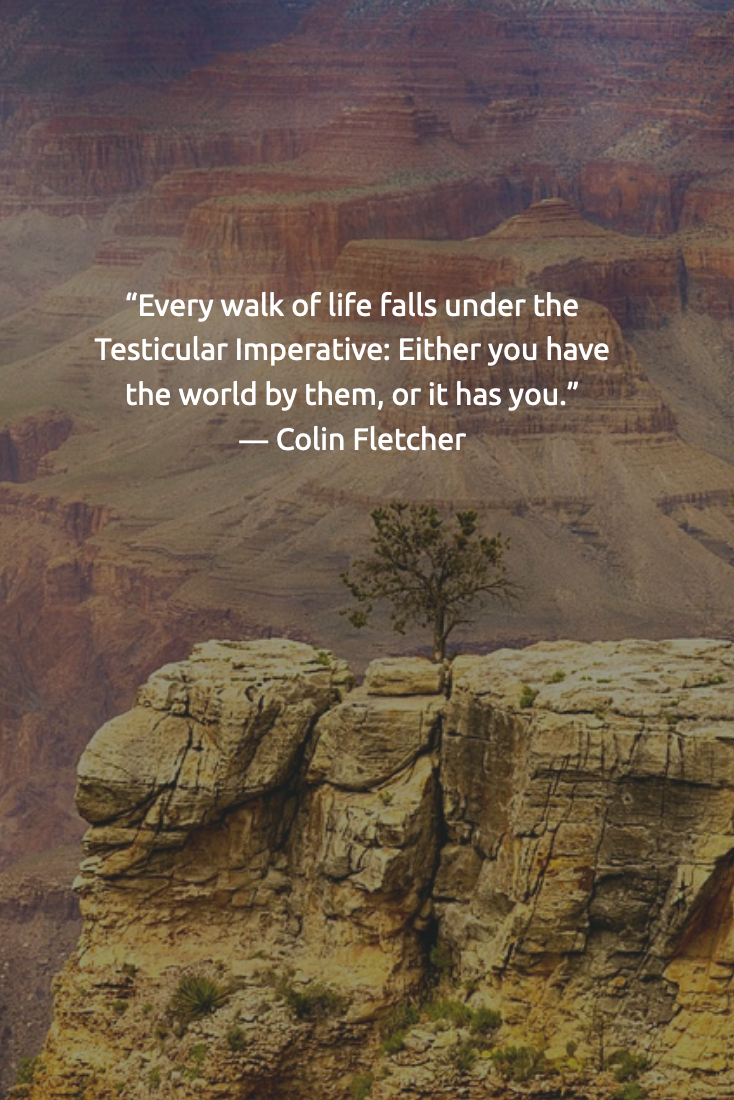
Colin Fletcher (The Man Who Walked Through Time) Says...
“There is a powerful human compulsion to leave things tied up in neat little bundles. But every journey except your last has an open end. And any journey of value is above all a chapter in a personal odyssey. Its end is not so much a goal attained as another point in a continuing process. And the important thing at the end of a journey--or of a book--is to keep moving forward, refreshed, with as little pause as possible.”
Colin Fletcher (1922–2007) was a writer and a pioneering backpacker. Ever since reading his book The Complete Walker, which is an extremely in-depth guide to backpacking, I've always considered him to be the foremost guru of backpacking in America.
In 1963 at age sixty-seven, he undertook a rigorous six-month expedition down the length of the Colorado River, backpacking that portion of the Grand Canyon contained within the boundaries of what in 1963 was the area of the Grand Canyon National Park.
Fletcher was only the second person to complete this section and the first to accomplish the feat "in one go" — to walk a continuous route through the Grand Canyon as chronicled in his bestselling 1968 memoir The Man Who Walked Through Time: The Story of the First Trip Afoot Through the Grand Canyon.
An interesting fact is that when Fletcher took his backpacking trip in 1963, the park did not encompass the entire length of the Grand Canyon, although eventually the National Park was expanded so that it did contain the entire canyon. So Fletcher only walked about half of the physical canyon, though he was correct in saying he was the first to walk that section of the canyon designated as the national park. Kenton Grua, a professional river guide, was actually the first person in recorded history to walk the entire length of the Grand Canyon, in 1977. He claimed that he was inspired by Fletcher's book but was motivated to set out to "do it right" by walking the entire canyon from end to end, not just the section inside the national park.
"Life should be an unfinished business."
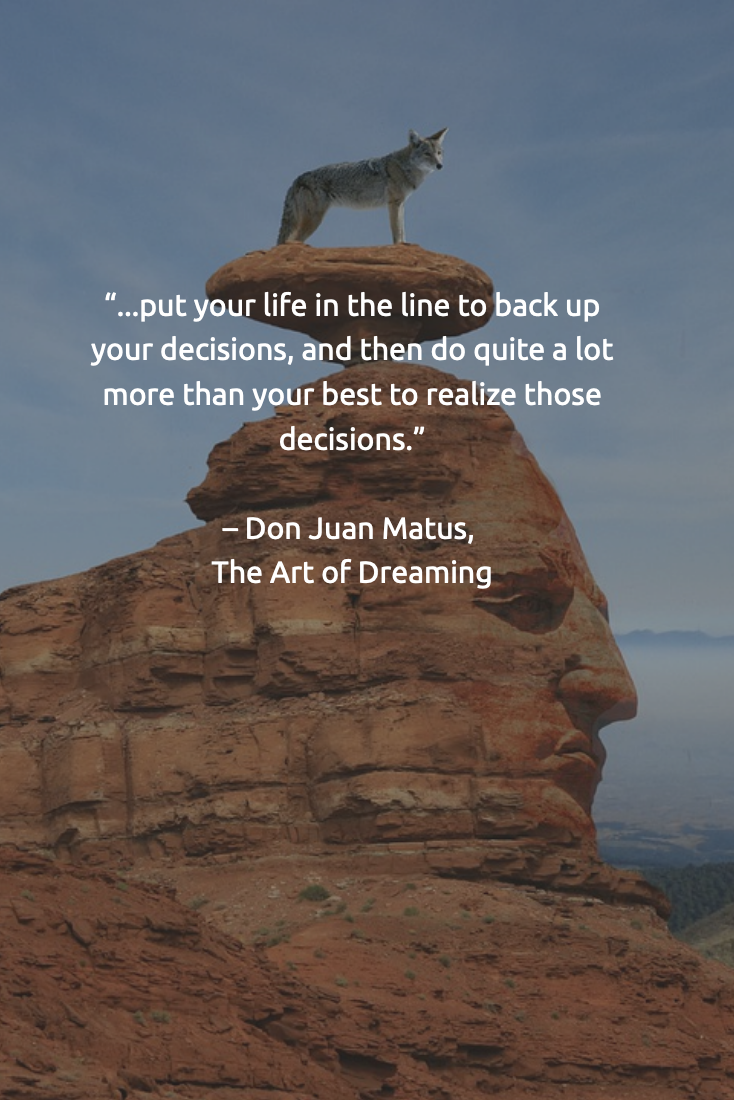
Carlos Castaneda (for Don Juan) Says...
“You have everything needed for the extravagant journey that is your life.”
The Teachings of Don Juan: A Yaqui Way of Knowledge was published by the University of California Press in 1968 as a work of anthropology, though many critics contend that it is a work of fiction. It was written by Carlos Castaneda (1925–1998) and submitted as his Master's thesis in the school of Anthropology. It purports to document the events that took place during an apprenticeship with a self-proclaimed Yaqui Indian Sorcerer, don Juan Matus from Sonora, Mexico between 1960 and 1965.
Castaneda's books are classified as non-fiction although they have been criticized as fictional, because certain scholars have debated "whether Castaneda actually served as an apprentice to the alleged Yaqui sorcerer don Juan Matus or if he invented the whole odyssey."
After reading the first of his series of books (A Yaqui Way of Knowledge) I found it to be very academic and “dry,” but I felt that it gave a great overview of Castaneda's initial point of view, which is then expanded upon in his followup books.
“For me there is only the traveling on paths that have heart, on any path that may have heart, and the only worthwhile challenge is to traverse its full length--and there I travel looking, looking breathlessly.” ― Carlos Castaneda, The Teachings of Don Juan: A Yaqui Way of Knowledge
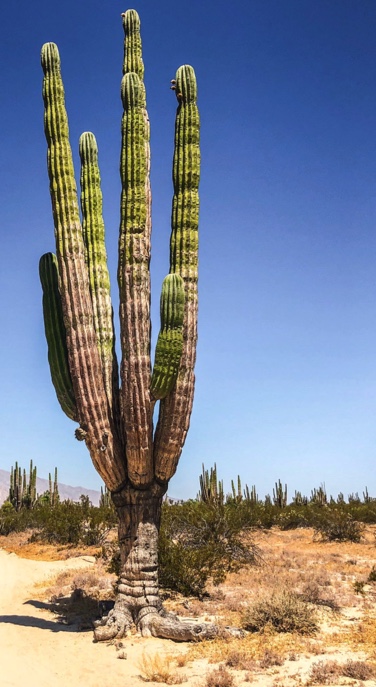
Don Juan Matus: Real or Imagined?
Supporters of Castaneda, who are most often found in the realm of the spiritual, occult, or shamanism rather than academia, typically maintain every word and every aspect of his series of books are factual and nothing but true. Detractors say the contents don't even come close to being accurate or consistent, and even if there is an element or thread of truth woven throughout his series of books they are not to be taken seriously.
In his second book, A Separate Reality, Castaneda, telling the same story as in his first and last books, presents to the readers seemingly different scenarios. Which is why because of these discrepancies and inconsistencies, Castaneda critics dismiss him as nothing more than a charlatan. But apparently Castaneda never thought of this as a problem.
And it's true that his third book, Journey to Ixtlan, was in its final published form virtually indistinguishable from the manuscript he turned in for his UCLA PhD dissertation.
So the question arises, on such slim evidence in the public domain on the existance of field notes to back it up with, did his graduate committee have access to his field notes or other valid documentation that would verify his fieldwork? Some say such was NOT the case, however, it is a given his graduate committee DID sign off on his dissertation and UCLA DID in fact grant Castaneda his PhD.“For me the world is weird because it is stupendous, awesome, mysterious, unfathomable; my interest has been to convince you that you must assume responsibility for being here, in this marvelous world, in this marvelous desert, in this marvelous time. I want to convince you that you must learn to make every act count, since you are going to be here for only a short while, in fact, too short for witnessing all the marvels of it.” ― Carlos Castaneda, Journey to Ixtlan
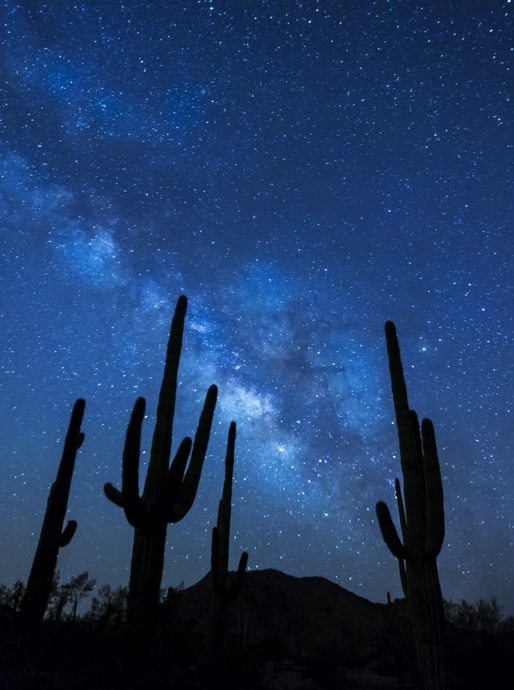
in the tenth book in his series, Magical Passes, Castaneda offers his strongest clarification of Don Juan's background, some of which of course, had been spattered here and there throughout each of his previous books over time as well. According to Castaneda, his teacher Don Juan Matus was supposedly born in 1891 and died in 1973, although some references cite 1976.
Castaneda supposedly met Don Juan in the late spring, early summer of 1960. He apprenticed under him and over the years wrote a dozen books covering his experiences. However, during that time, except for one sometimes called into question source, nobody except Castaneda seems to have personally met or confirmed a meeting with Don Juan under any circumstances.
A now retired professor of anthropology at Occidental College, Dr. C. Scott Littleton, who knew Castaneda well having attended UCLA graduate school with him in the same department at the same time, and because of the level of their friendship had Castaneda as a most willing guest lecturer in his classes at both Occidental and UCLA Extension on many occasions, is on record as saying in a published interview with Laura Knight-Jadczyk that he was convinced there was indeed a prototype of Don Juan and that he was probably a Yaqui Indian who moved rather freely between the Tucson area and northern Sonora --- the Tucson area and northern Sonora being the same general locality suspected as the habitation place of his unnamed and unidentified master teacher.
In the world of writing, both fiction and non-fiction, Carlos Castaneda is deemed to be one of the most controversial authors ever. In the scientific arena and a good part of academia the same holds true, and especially so by those with well established credentials in the anthropological and archaeological fields.
So even though he's highly controversial and most certainly not the fully unmitigated expert in the field, he is widely read and a well known person when mentioned, to have claimed the ability to enter a life-long journey of seeking knowledge through shamanistic rituals.
Shamanism is truly an ancient cross cultural world-wide phenomenon, albeit sometimes lost on those of the modern era. For some of us though, there remains a thread, however slight or however tenuous, whether it is linked to Native American Tribes, or elsewhere, that ties us to that past, keeps us on the path, and continues to teach us a way to think about our life as we travel to destinations far ahead and way beyond.
“They find joy in motion, which transforms their lives into unending odysseys. Their souls are brightly burning streaks of light across the universe—constantly traveling in an endless dance across space and time.”
― Dine: A Tribute to the Navajo People








